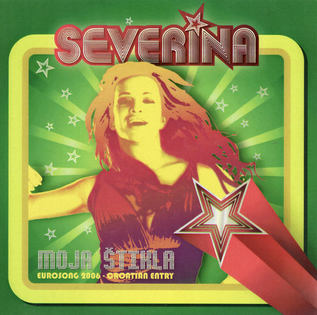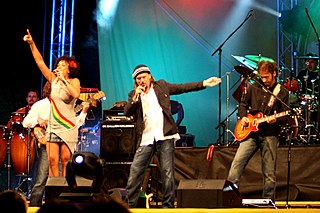Related Research Articles

Vinko "Vice" Vukov was a Croatian singer and politician.

E.N.I. or ENI is a Croatian pop band and girl group from Rijeka consisting of members Ivona Maričić, Iva Močibob, Elena Tomeček Zdjelar and Nikolina Tomljanović. The group debuted in early 1997 with their single "Probudi me" which was later chosen at Dora 1997 to represent Croatia at the Eurovision Song Contest 1997 in Dublin, Ireland. Their debut album Probudi me was released shortly after, in late 1998.
Đorđe Novković was a Croatian songwriter of partly Serbian descent who was known for his work in Yugoslavia and Croatia. Novković composed more than 2,500 songs and sold approximately 20 million records. He is also known as the father of popular Croatian singer Boris Novković.

Croatia has participated in the Eurovision Song Contest 29 times since making its debut at the 1993 contest. The Croatian participant broadcaster in the contest is Hrvatska radiotelevizija (HRT), which has selected its entrant at the Dora festival since 1993, excluding from 2012 to 2018. Croatia's best result in the contest is a second-place finish in 2024.
Croatia was represented at the Eurovision Song Contest 2006 with the song "Moja štikla", composed by Boris Novković and Franjo Valentić, with lyrics by Severina Vučković, and performed by Severina herself. The Croatian participating broadcaster, Hrvatska radiotelevizija (HRT), organised the national final Dora 2006 to select its entry for the contest. Thirty-two entries competed in the national final which consisted of three shows: two semi-finals and a final. Eight entries qualified from each semi-final on 2 and 3 March 2006 to compete in the final on 4 March 2006. In the final, "Moja štikla" performed by Severina was selected as the winner following the combination of votes from a five-member jury panel and a public televote. Songwriter Novković had represented Croatia in 2005 together with Lado members.

"Moja štikla" was the Croatian entry in the Eurovision Song Contest 2006, performed in Croatian by Severina. The song was chosen to represent Croatia after winning Dora 2006, Croatia's national final.

Kaliopi Bukle, known professionally as Kaliopi, is a Macedonian singer-songwriter. In her career, Kaliopi has progressed from singing lead vocal with her eponymous band in 1980s Yugoslavia to being an established vocalist and composer working in North Macedonia and across former Yugoslavia. She represented Macedonia twice in the Eurovision Song Contest, first in 2012 in Baku, Azerbaijan with "Crno i belo" and a second time in 2016 in Stockholm, Sweden with the song "Dona".
Croatia was represented at the Eurovision Song Contest 2004 with the song "You Are the Only One", composed by Ivan Mikulić, with lyris by Vedran Ostojić and Duško Gruborović, and performed by Mikulić himself. The Croatian participating broadcaster, Hrvatska radiotelevizija (HRT), organised the national final Dora 2004 to select its entry for the contest. Twenty-four entries competed in the national final which consisted of three shows: two semi-finals and a final. Six entries qualified from each semi-final on 12 and 13 March 2004 to compete in the final on 14 March 2004. In the final, "Daješ mi krila" performed by Ivan Mikulić was selected as the winner following a regional televote. The song was later translated from Croatian to English for Eurovision and was titled "You Are the Only One".

Croatian popular music is the popular music of Croatia.
Croatia participated in the Eurovision Song Contest 2008 with the song "Romanca" written by Miran Hadži Veljković. The song was performed by the band Kraljevi ulice and 75 Cents. The Croatian broadcaster Croatian Radiotelevision (HRT) organised the national final Dora 2008 to select the Croatian entry for the 2008 contest in Belgrade, Serbia. A total of twenty-four entries competed in the national final which consisted of two shows: a semi-final and a final. In the semi-final on 22 February 2008, six entries qualified to compete in the final on 23 February 2008 alongside ten pre-qualified songs. In the final, "Romanca" performed by Kraljevi ulice and 75 Cents was selected as the winner following the combination of votes from a five-member jury panel and a public televote.
Croatia was represented at the Eurovision Song Contest 1993 with the song "Don't Ever Cry", composed by Andrej Baša, with lyrics by Đorđe Novković, and performed by the band Put. The Croatian participating broadcaster, Hrvatska radiotelevizija (HRT), selected its entry for the contest through Dora 1993. This was the first-ever entry from independent Croatia in the Eurovision Song Contest.
Croatia was represented at the Eurovision Song Contest 1997 with the song "Probudi me", composed by Davor Tolja, with lyrics by Alida Šarar, and performed by the band E.N.I.. The Croatian participating broadcaster, Hrvatska radiotelevizija (HRT), selected its entry for the contest through Dora 1997.
Croatia participated in the Eurovision Song Contest 2010 with the song "Lako je sve" written by Branimir Mihaljević, Pamela Ramljak and Neda Parmać. The song was performed by the group Feminnem, which had previously represented Bosnia and Herzegovina in the Eurovision Song Contest in 2005 where they placed fourteenth with the song "Call Me". The Croatian broadcaster Croatian Radiotelevision (HRT) organised the national final Dora 2010 to select the Croatian entry for the 2010 contest in Oslo, Norway. A total of twenty-four entries competed in the national final which consisted of two shows: a semi-final and a final. In the semi-final on 5 March 2010, eight entries qualified to compete in the final on 6 March 2010 alongside eight pre-qualified songs. In the final, "Lako je sve" performed by Feminnem was selected as the winner following the combination of votes from a nine-member jury panel and a public televote.
Croatia was represented at the Eurovision Song Contest 2003 with the song "Više nisam tvoja", written by Andrej Babić, and performed by Claudia Beni. The Croatian participating broadcaster, Hrvatska radiotelevizija (HRT), organised the national final Dora 2003 to select its entry for the contest.
Croatia was represented at the Eurovision Song Contest 2000 with the song "Kad zaspu anđeli", composed by Zdenko Runjić, with lyrics by Nenad Ninčević, and performed by Goran Karan. The Croatian participating broadcaster, Hrvatska radiotelevizija (HRT), organised the national final Dora 2000 to select its entry for the contest. Twenty-six entries competed in the national final on 19 February 2000 and "Ostani" performed by Goran Karan was selected as the winner following the combination of votes from 20 regional juries and a public televote. The song was later retitled as "Kad zaspu anđeli".
Croatia was represented at the Eurovision Song Contest 2001 with the song "Strings of My Heart", written by Tonči Huljić, Vjekoslava Huljić, and Ante Pecotić, and performed by Vanna. The Croatian participating broadcaster, Hrvatska radiotelevizija (HRT), organised the national final Dora 2001 to select its entry for the contest. Twenty entries competed in the national final on 4 March 2001 and "Strune ljubavi" performed by Vanna was selected as the winner following the combination of votes from five regional juries, a six-member expert jury, a regional televote and an online vote. The song was later translated from Croatian to English for Eurovision and was titled "Strings of My Heart".
This is a list of Croatian television related events from the 1990s.
Croatia participated in the Eurovision Song Contest 2019 with the song "The Dream" written by Jacques Houdek, Andrea Čubrić and Charlie Mason. The song was performed by Roko. Songwriter Jacques Houdek represented Croatia in the Eurovision Song Contest 2017 with the song "My Friend" where he placed thirteenth in the grand final of the competition. The Croatian broadcaster Croatian Radiotelevision (HRT) organised the national final Dora 2019 to select the Croatian entry for the 2019 contest in Tel Aviv, Israel. Sixteen entries competed in the national final on 16 February 2019 and "The Dream" performed by Roko was selected as the winner following the combination of votes from ten regional juries and a public televote.
Croatia originally planned to participate in the Eurovision Song Contest 2020 with the song "Divlji vjetre" written by Ante Pecotić. The song was performed by Damir Kedžo. The Croatian broadcaster Croatian Radiotelevision (HRT) organised the national final Dora 2020 to select the Croatian entry for the 2020 contest in Rotterdam, Netherlands. Fourteen entries competed in the national final on 29 February 2020 and "Divlji vjetre" performed by Damir Kedžo was selected as the winner following the combination of votes from five regional juries and a public televote.
References
- ↑ Milinković, Sanda (22 February 2022). "Putokazi, završni meandar: Dugo, nevjerojatno, neponovljivo putovanje je završeno". Novi list. Retrieved 22 April 2024.
- ↑ "1993 – Opatija (HTF)". eurosong.hr. Retrieved 22 April 2024.
- ↑ "Final of Millstreet 1993 - Eurovision Song Contest". eurovision.tv. Retrieved 22 April 2024.